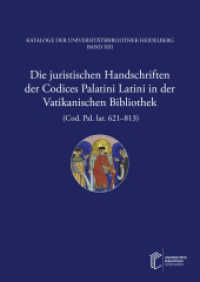Description
(Short description)
The thesis finds a normative approach for trial 'in absentia' at International Criminal Tribunals by applying classical sources of international criminal law and analysing procedural theory as well as fundamental rights. Through a critical analysis of concepts presented as models for trial 'in absentia' it introduces a new concept for trials 'in absentia' which considers both the defendant's right and duty to be present.
(Text)
The thesis finds a normative approach to the question whether trial in absentia is suitable for International Criminal Tribunals by applying classical sources of international criminal law and combining institutional aspects of the procedural theory, specifically the goals of the international criminal trial, with the individual frameworks of fundamental rights, namely the right to be present. Through a critical analysis of concepts presented as models for trial in absentia it introduces a new concept for trials 'in absentia' which considers both the defendant's right and duty to be present. The book thereby establishes a connection between legal theory, international criminal procedural law, international human rights law and comparative law on the one hand and - considering the high number of accused of International Criminal Tribunals at large - a highly relevant procedural question on the other hand.
(Table of content)
1. Introduction: Goals and scope of this study - Working Definitions
2. Proceedings in absentia at ICTs: The investigative phase at ICTs - IMT and IMTFE - ICTY, ICTR and MICT - Hybrid tribunals - ICC - Appeals Stage - Conclusions
3. Procedural theory: Goals of ICTs: Goals of international criminal justice - macro level - Goals of international criminal procedure - micro level - Conclusions
4. Sources of International criminal procedure: Generally applicable sources
5. Requirements for trials in absentia deriving from human rights law: Requirements for the conduction of trials in absentia - Adjustment of international human rights standards as response to the needs of international criminal procedure - Compatibility of trials in absentia with the right to a fair trial - Conclusions
6. Trials in absentia as general principle?: Determination of general principles - Reports on foreign law - Comparison - Determination of general principles with regards to proceedings inabsentia - Conclusions and interim findings
7. Conceptualising trials in absentia: ICTs' and human rights supervisory bodies' practice - Theoretical considerations - Concepts for trials in absentia - Conclusions
8. Final thoughts and conclusions
9. Results and prospects
Bibliography, Index
(Text)
The thesis finds a normative approach to the question whether trial 'in absentia' is suitable for International Criminal Tribunals by applying classical sources of international criminal law and combining institutional aspects of the procedural theory, specifically the goals of the international criminal trial, with the individual frameworks of fundamental rights, namely the right to be present. Through a critical analysis of concepts presented as models for trial 'in absentia' it introduces a new concept for trials 'in absentia' which considers both the defendant's right and duty to be present. The book thereby establishes a connection between legal theory, international criminal procedural law, international human rights law and comparative law on the one hand and - considering the high number of accused of International Criminal Tribunals at large - a highly relevant procedural question on the other hand.








